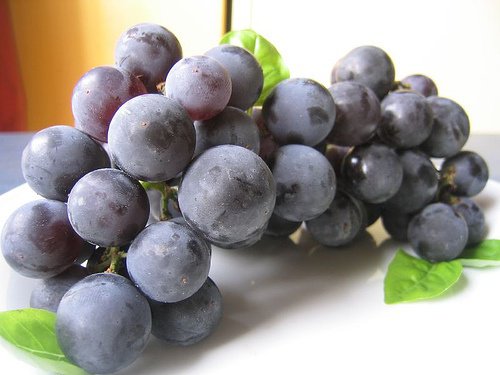Grapes: One of the Best Foods for Kidney Health


Written and verified by psychologist Valeria Sabater
How do you usually try to care for your kidneys? Do you drink enough water? Have you eliminated salt from your diet? Do you get a little exercise every day? Do you ever look into foods for kidney health?
All of the above are essential when it comes to maintaining good kidney health. But sometimes it’s easy to forget some of these simple tips or make excuses, until one day the first symptom of kidney problems appears.
Pain in your lower back that radiates to the abdomen, a burning sensation when you urinate, changes in the color of your urine…all these things are signs that something is happening to your kidneys.
So why not try to improve your lifestyle? Why not always add grapes to a healthy diet? These have such positive effects that they are some of the best foods for kidney health.
The benefits of grapes, one of the best foods for kidney health

The health of your kidneys is something serious that you need to remember in your day-to-day life, because it’s not just genetics that can determine your risk of suffering from a particular problem. Your lifestyle and eating habits are fundamental its health. A healthy lifestyle and a balanced diet are the real best foods for kidney health.
This is why it’s important to include certain foods in your diet that enhance the health of your kidneys, helping it continue to filter your blood and eliminate waste from your body.
This is why we recommend that, starting today, you add grapes to your diet. This medicinal fruit has properties that help protect your kidneys and keep them functioning properly.
Also Read: Juices to Help Deal With Kidney Stones
The power of grape seeds for the kidneys
When you eat grapes, never discard the seeds. Do you know why?
- Grape seeds are rich in phenolic acid and proanthocyanidins, two types of antioxidants that strengthen the kidneys aside from their other significant health benefits.
- Another interesting fact about grape seeds is that those antioxidants, along with vitamins C and E and beta-carotene, actually stay in the kidneys for almost three days, helping you purify the bloodstream of toxins and optimize your kidney function.
- Grape seeds also regulate blood pressure, improving your circulation and also strengthening the blood vessels.
- According to a study published in the journal Applied Physiology, grape seeds and grape seed extract might even help burn fat in people who are overweight. Remember that excess fat, and not just alcohol, can cause kidney problems.
The benefits of grape juice
- Natural grape juice with no sugar added is a concentrated source of antioxidants that protects you against the effects of free radicals that can harm the kidneys.
- Don’t forget that grape juice is an excellent vasodilator, which means that it can help cleanse your veins and arteries, fighting arteriosclerosis, a problem that also affects your kidneys.
- The health magazine All 4 Natural Health claims that organically grown grapes – those that have never been treated with pesticides – reduce the levels of uric acid in the body and cleanse your liver and kidneys of waste and toxins.
How should you consume grapes to care for your kidneys?
First of all, don’t forget that grapes do contain sugar, so if you want to maximize your benefits, you need to consume them in moderation according to the following simple guidelines:
- Around 15 grapes per day is the right amount to enhance the health of your kidneys.
- When is the best time to eat grapes? In the morning. You can add grapes to your bowl of oatmeal or unsweetened, plain yogurt. They’re also excellent when simply combined with other fruits.
- What variety of grapes is the healthiest? Red grapes, because they contain more antioxidants.
- It’s important to always buy organic grapes. At the very least, you should figure out whether they’ve been treated with pesticides or harmful chemicals.
- Always eat the skin and the seeds.
- If you prepare your own grape juice, don’t strain the mixture. Consume the skin and the seeds, as we said above.
- Grapes are more than just a fruit for breakfast or a dessert. They go perfectly with salads, baked meat dishes, and even veggies. They’re delicious!
Eat grapes any time grapes are in season. Don’t hesitate to add them to your diet to take better care of your kidneys.
All cited sources were thoroughly reviewed by our team to ensure their quality, reliability, currency, and validity. The bibliography of this article was considered reliable and of academic or scientific accuracy.
- Rauf, A., Imran, M., Butt, M. S., Nadeem, M., Peters, D. G., & Mubarak, M. S. (2018). Resveratrol as an anti-cancer agent: A review. Critical Reviews in Food Science and Nutrition. https://doi.org/10.1080/10408398.2016.1263597
- Saldanha, J. F., Leal, V. D. O., Stenvinkel, P., Carraro-Eduardo, J. C., & Mafra, D. (2013). Resveratrol: Why is it a promising therapy for chronic kidney disease patients? Oxidative Medicine and Cellular Longevity. https://doi.org/10.1155/2013/963217
- Bertelli, A. A. E., Migliori, M., Panichi, V., Origlia, N., Filippi, C., Das, D. K., & Giovannini, L. (2002). Resveratrol, a component of wine and grapes, in the prevention of kidney disease. In Annals of the New York Academy of Sciences. https://doi.org/10.1111/j.1749-6632.2002.tb02919.x
This text is provided for informational purposes only and does not replace consultation with a professional. If in doubt, consult your specialist.








